-
Skin Job by Gregor Hartmann
This short story throws a very simple, but radical, premise and uses it to tell a thought provoking story. An illegal drug makes it possible to change ones skin color and a group of high school kids finds out that it isn’t all fun and games.
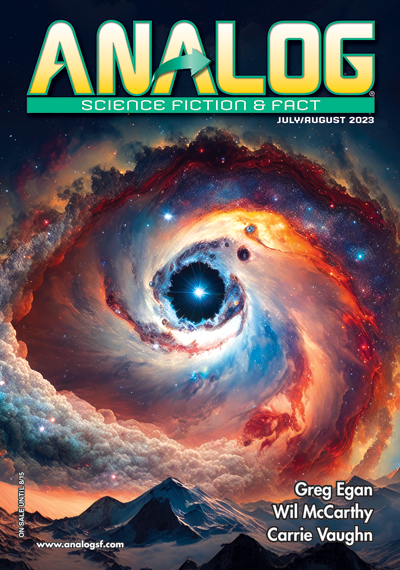
A couple of high school kids orders a drug from a shady internet site which allows them to change their skin color. On the surface they have noble intentions, like getting to experience racism they haven’t before, like being pulled over by the cops seemingly for merely being dark skinned. However, people born as that race rightfully don’t appreciate that their identity is being used like something you can just try on and remove again. Then the FBI gets involved and the kids end up in serious trouble.
What I like about this story is that isn’t didactic or condescending, even though it is pretty obvious that the author doesn’t think this will be a very good idea. The story does touch upon some interesting question with regards to how one can compare the experience of just being black for one day versus and entire lifetime, and how we can properly learn from other peoples experiences.
Read in Analog July/August 2023
Rating: 3 -
Options by John Varley
This story from 1979 feels very much ahead of its time and I think it is relevant and worth reading today for how it explores what gender means for our identity, even though it is based on a traditional binary view of gender.
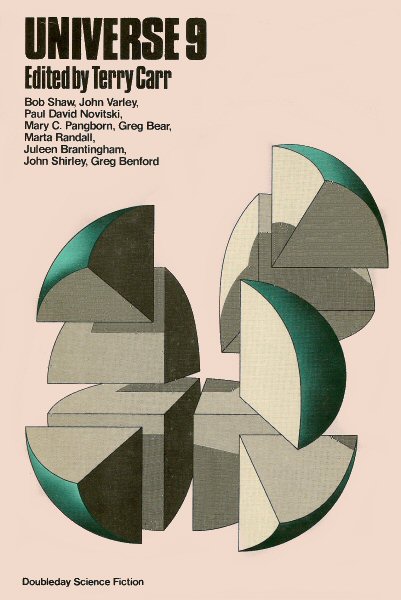
The setup is surprisingly simple and effective. A simple procedure at the local clinic allow people to change their biological sex - and plenty of people do. The story follows a regular couple with a man - Jules - and a woman - Cleo, where the woman wants to change into a male body and her husband is not really comfortable with that. She gradually makes the change, explores what life is like in a male body and encounter other people who have changed sex as well - some multiple times. Jules stays as one but gradually comes to terms with the new body and identity of Cleo.
While the story is told mostly from Cleos point, Varley gives enough time for the reader to get into and understand both characters and how they feel about the whole ordeal. They have honest, open and relatable conversations about their relationship and what gender means for them. It makes you think about how you see your partner and the complications that arise when there is conflict between one persons own desires and their partners expectation of them. Like I would never require that my wife asked me for permission if she wanted to change her hair, but if she wanted a sex change? I think I would at least be warned first and I am honestly not sure if we could still be together. And those kinds of dilemmas are well explored in this story, with questions on how much our biological gender defines us as a person and whether we could still love that person with a different gender.
What made reading this extra interesting was seeing that is has been discussed on the Young People Read Old SFF site and it was surprising, and thought provoking, to see how much they criticized it. I can understand the criticism on how Varley solely focuses on male and female, and that gender identity is only shown as something connected to your body. But for someone like me, a regular straight white male born in the 80s who have never thought much about gender identity, I need a story like this to force me to reflect on these things - even though it is presented in a very binary male/female way.
Read in The John Varley Reader
Originally published in Universe 9
ISFDB Link
Rating: 5 -
The Matthews Conundrum by Edward M. Lerner
I have come to learn that Edward M. Lerner is reliable in providing with good entertaining stories with plenty of well researched science. This long novella delivered all that with another interesting take on the Fermi paradox.
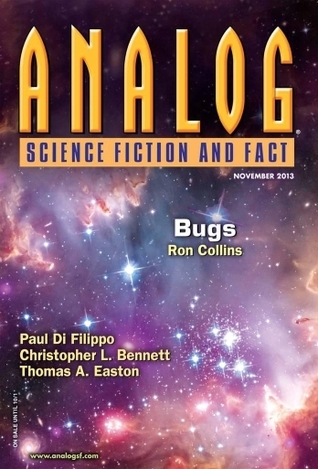
Set in a close to utopian future where Earth have made contact with other alien races through radio and advancement in technology takes care of everyone’s needs, and people mostly work for fun or in very specialized fields. The story follows Joshua who works as a historian for the International Commerce Union - the organization that handles the tradedeals with the alien races. At a party he disappears only to return a month later without any knowledge of what happened. People around mostly thinks he just went on a drunken spree, his reputation is ruined and he looses his job. One journalist do believe him and they set out to figure out what really happened.
This doesn’t sound much of a science fiction plot, but it is all connected to interstellar network that Earth has become part of. Joshua is one of the few people who have publicly questioned some oddities around the aliens Earth has made contact with. Like why are they all so relatively close together in the galaxy and all at similar levels of technology? Sort of like in Star Trek, and not unlike in that, there appears to be greater forces at work here.
It is a story with lots of talking, speculations and world building - not a whole lot of action or even much that gets resolved or fully explained. When done well here like Lerner does, that is a type of story I enjoy but it might not be for everyone. Apparently it is part of a longer series, but I had no trouble with it despite not having read any previous installments.
Read in Analog November 2023
Rating: 3 -
The World in a Ramen Cup by Jayde Holmes
This story delivers exactly what its title says. It manages to put a lot of deep meaning and feeling into a cup of instant noodles and it is among the best stories from Analog this year.

An alien called Tk’Kii-mi have aquired the last existing human food from Earth - a ramen cup. The alien belongs to a species that through digestion of food “save” stories from other beings. Tk’Kii-mi has invited The Last Human (not the last human alive, just the last human to have come from Earth) to share this cup of noodles with him - with the purpose of digesting the humans story.
Tk-Kii-mi has some expectations to the story. He is looking for something grand that capture Earths entire history. However, The Last Human is just a normal woman missing her home planet and can only share her personal memories from her normal life. But her feelings and associations related to tasting a simple cup of instant noodles again, might just be the perfect portal into what life on Earth was like.
In a short number of pages the story portrays two interesting characters with an insight into their motivations and learnings they each gain from sharing a simple meal. Highly recommended.
Read in Analog July/August 2023
Rating: 4+ -
First Words by Michael Randle
What will the first words spoken on Mars be? Can anything top Niel Armstrongs famous words from the Moon?

This very short simply follows the astronaut that is going to be the first human to set foot in Mars and his struggle with finding out what his first words will be. There is nothing more to it than that, but it effectively portrays a believable scenario showing all the doubts the first human on Mars will likely have in that situation. Suffice to say, the story does end with the first words spoken on Mars - some may find it fitting and others disappointing.
Read in Analog July/August 2023
Rating: 3 -
Let the Games Begin by Robert Friedman & Barry N. Malzberg
This quirky humorous story filled with meta genre references takes the form of an email correspondence between Rob who claims to be abducted by aliens and Barry who doesn’t believe it but is never the less somewhat helpful with creative analysis of Robs situation.
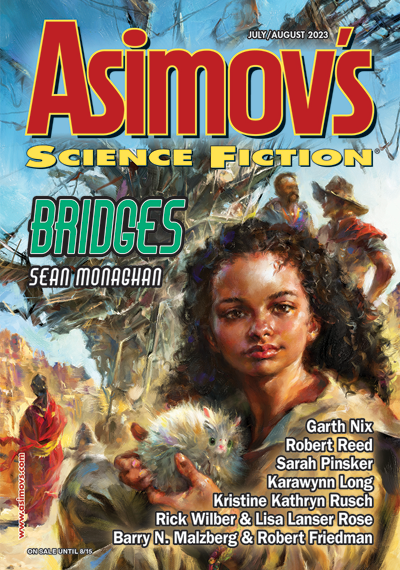
This story is aimed at science fiction fans that can appreciate this form of meta referential humour. It is well written, funny and does give the reader an interesting mystery plot to follow about what is really going on.
Read in Asimov’s July/August 2023
Rating: 3 -
Alphas by Gregory Benford
Aliens are in the solar system and headed for Venus. They completely ignore Earth and humans, and when some contact is finally established their message is basically saying to leave them alone and they won’t harm Earth.
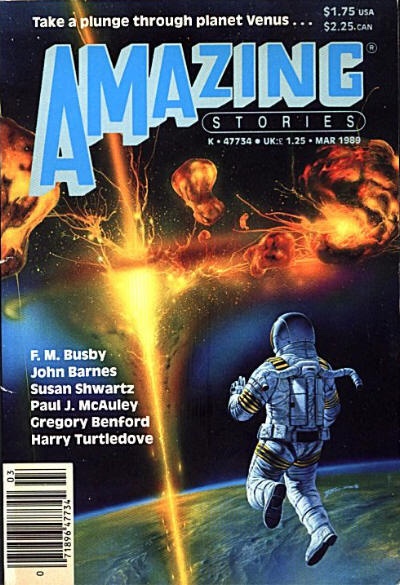
Of course humans being humans can’t handle their curiosity, so even though several unmanned probes come back destroyed, a manned expedition is still sent to see what the aliens are up to at Venus.
What they find can best described as a giant hoop that is cutting Venus in half like a cheese string cutter. They get too close to the thing and most of the story is dealing with engineering and physics problem solving.
This is proper hard sf complete with diagrams and math equations. I don’t believe you need any special knowledge on physics to get the story, but a certain interest in these kinds of thought experiment stories is probably required. I can appreciate these kinds of stories, Greg Egan is a master in it, but there needs to be more than just the problem and the weird physics thought experiment. The protagonist has an interesting AI assistent that helps him on the way, but other than that, it feels like the story mostly exist for the author to play around with a fun physics problem.
Read in The 1990 Annual World’s Best SF
Originally published in Amazing Stories, March 1989
ISFDB Link
Rating: 2+ -
Fermi's Silence by Jay Werkheiser
As the title shows this is a short story dealing with a possible explenation for the famous Fermi’s Paradox.

The story switches between two viewpoints both asking the same question. Why haven’t we detected alien life yet? One is human and the other is likely some silicium based life form. They both go back and forth with all their various data readings and observations, and unsurprisingly are only looking for life signs like themselves thus missing the others.
The story is only four pages and sort of amusing, but its point is fairly obvious and unoriginal from the start, so there isn’t much more to the story than that.
Read in Analog July/August 2023
Rating: 2 -
Cheaper to Replace by Marie Vibbert
We probably all have experiences with having something broken but it seems impossible or at least economical pointless to repair, and it is just easier and cheaper to buy a new one. So it is not unreasonable to imagine a future where planned obsolescence is applied to humanoid robots.
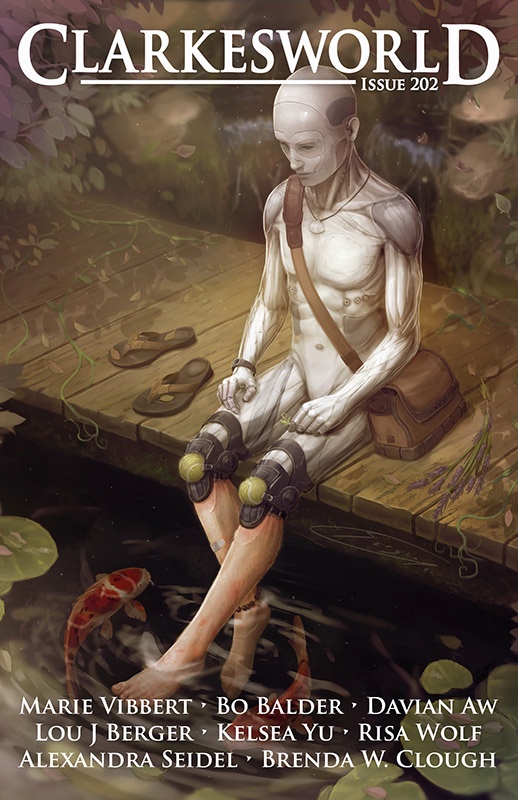
The story follows Hahn who is trying to repair her already old robot James. Everyone tells her it will easier to replace but she is clearly emotional attached to this very specific unit. There may be workarounds in their programming giving them the option of being functional just a bit longer.
It is very clear that the author wants to write a story criticizing planned obsolescence and she basically succeeds with this touching simple story. I just wish it had a little bit more than that, because while it has a couple of charming moments it never goes anywhere unexpected.
Read in Clarkesworld July 2023
Rating: 2+ -
Vast and Trunkless Legs of Stone by Carrie Vaughn
Aliens arrive on Earth but instead of saying “take me to your leader”, they say “I want a conversation with a normal person”. A familiar concept but slightly different.
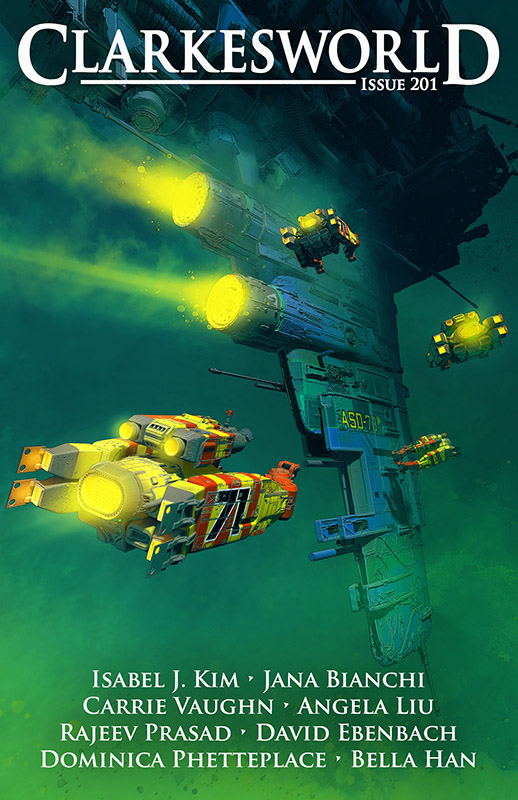
Mal has been chosen for the task and an army of government advisors have tried to prepare her for the conversation she is supposed to have alone with the alien. Unsurprisingly, all the plans for getting the secrets to their propulsion system goes out the window when the alien steers the conversation at something completely different.
It is a nice little story about first contact expectations and what really matters in the universe. The meat of the story is the unique conversation Mal has with the alien, where Vaughn really captures the nervous ramblings that would be likely for any person in that situation. I liked how the story writes itself into tbe tradition of more positive first contact stories and aliens with a mostly information gathering motivation.
Read in Clarkesworld June 2023
Rating: 3+